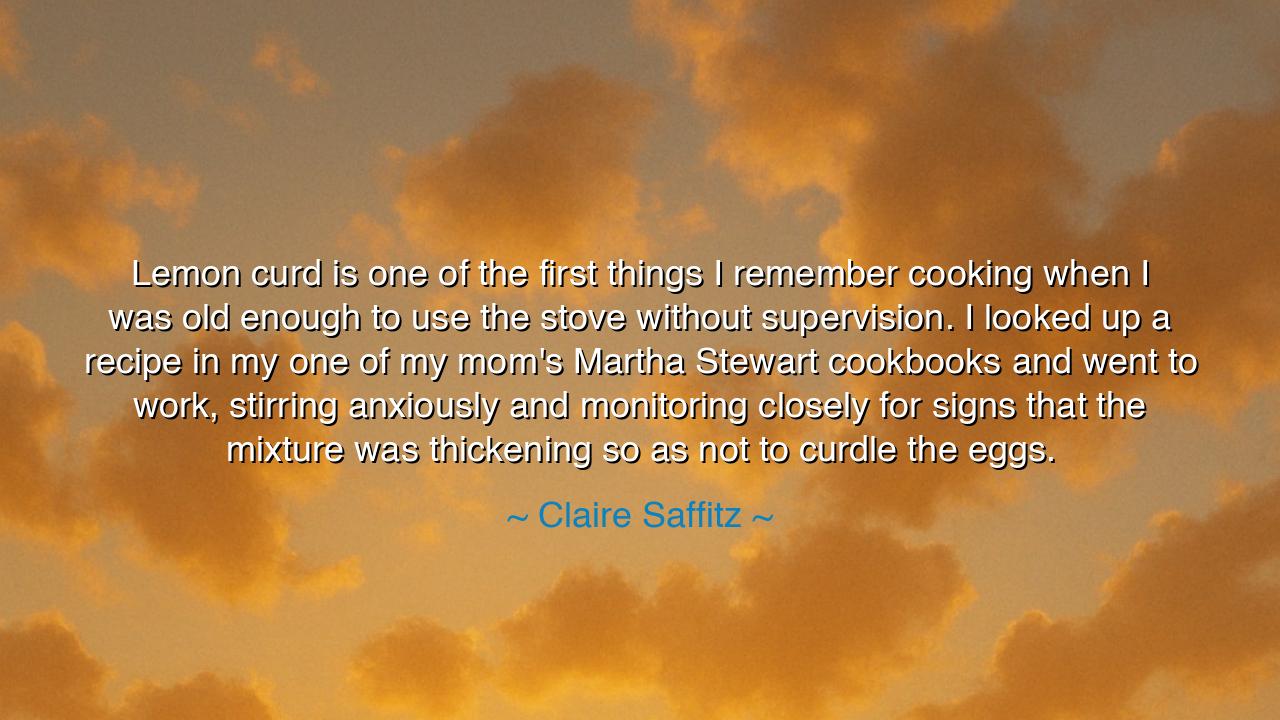
Lemon curd is one of the first things I remember cooking when I
Lemon curd is one of the first things I remember cooking when I was old enough to use the stove without supervision. I looked up a recipe in my one of my mom's Martha Stewart cookbooks and went to work, stirring anxiously and monitoring closely for signs that the mixture was thickening so as not to curdle the eggs.






The words of Claire Saffitz, “Lemon curd is one of the first things I remember cooking when I was old enough to use the stove without supervision. I looked up a recipe in one of my mom's Martha Stewart cookbooks and went to work, stirring anxiously and monitoring closely for signs that the mixture was thickening so as not to curdle the eggs,” speak not only of a memory, but of a rite of passage, a moment when childhood curiosity became disciplined creation. Beneath the image of a young girl standing before the stove lies the universal story of growth—the tender balance between freedom and control, between the joy of doing and the fear of failure. In this simple act of cooking, she reveals the ancient rhythm of all craftsmanship: the mingling of patience, precision, and courage that turns ordinary ingredients into art.
To the untrained ear, her words may sound like nostalgia, but to those who listen deeper, they echo a profound truth about the nature of learning. The young Claire, stirring anxiously and watching for signs that the mixture would not curdle, mirrors every soul who has ever stepped alone into the arena of creation. Whether it be an artist before the canvas, a writer before the page, or a blacksmith before the forge, all stand before their own “stove,” trembling yet determined. The lemon curd becomes a symbol of the fragile alchemy between fear and mastery—where one must act boldly, yet with reverence for the process.
The story of her mother’s cookbook is no less important. It represents the wisdom passed down through generations—the link between tradition and individuality. She did not invent the recipe; she inherited it, just as we all inherit the foundations of our craft from those who came before. Yet, in following it, she made it her own. This is how knowledge lives: through the hands that reawaken it. Just as ancient apprentices once learned from their masters, Saffitz learned from her mother’s book, not through memorization, but through experience. The true wisdom was not in the written recipe—it was in the act of stirring, watching, and feeling.
History offers many mirrors to this moment. The Renaissance sculptor Benvenuto Cellini, in his memoirs, recounts how he nearly destroyed one of his bronze castings through impatience. The metal cooled too quickly, threatening to ruin months of work. In desperation, he threw in every scrap of metal he could find—his household utensils, even the tin from his roof—until the mixture regained its fire and flowed again. Like Saffitz, he learned that creation demands attention and humility, that mastery is earned through moments of near failure. The line between perfection and ruin is often as thin as the one separating thickened lemon curd from curdled eggs.
Claire Saffitz’s quote also speaks to the beauty of self-reliance. The phrase “old enough to use the stove without supervision” marks that sacred threshold between dependence and independence, when the child first realizes that their own hands are capable of creation. The act of cooking alone becomes an initiation into adulthood, a moment when responsibility replaces permission. Yet this freedom is not reckless—it is measured by care, by the awareness that even freedom requires discipline. To cook, as to live, is to be entrusted with the power to transform, and that power must be guided by respect for both the flame and the ingredients.
There is also quiet emotion in her anxious stirring—the vulnerability of someone learning to trust themselves. It is a reminder that mastery begins with imperfection. Every artist, every builder, every thinker begins as the child before the stove, afraid that the eggs will curdle, that the creation will fail. But through persistence and patience, that fear becomes focus, and that focus becomes peace. The lesson is not in perfection, but in the willingness to keep stirring—to stay present in the process, to remain humble before the task.
The lesson of this memory is timeless: nurture your craft with patience, honor your teachers, and never fear the trembling that accompanies new beginnings. For trembling is not weakness—it is the body’s recognition of something sacred. Whatever your “lemon curd” may be, approach it as Saffitz did: with careful attention, with reverence for the craft, and with courage to learn through doing. The world is stirred into beauty by those who, despite uncertainty, continue to create. So take up your spoon, your pen, your hammer, your brush—and begin. Watch closely, move gently, and trust that through care and persistence, what once was fragile will become something golden, smooth, and whole.






AAdministratorAdministrator
Welcome, honored guests. Please leave a comment, we will respond soon